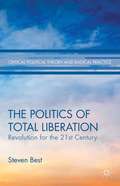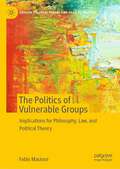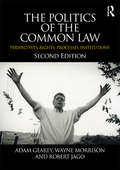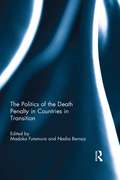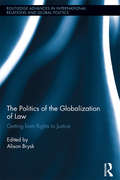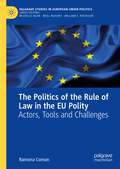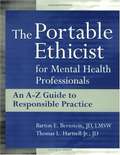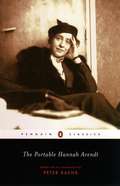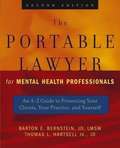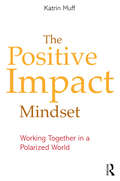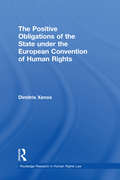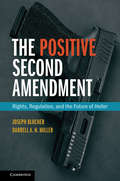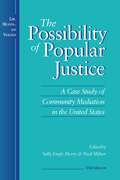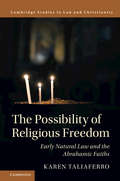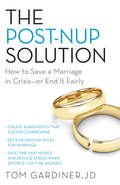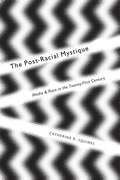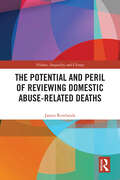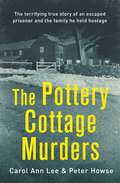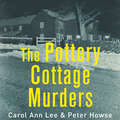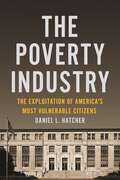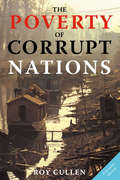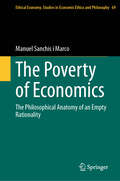- Table View
- List View
The Politics of Total Liberation
by Steven BestThis book argues that there is an ongoing planetary crisis, in both the social and natural worlds, that is of urgent importance. This demands a new politics, a politics of total liberation, one that grasps the need to unite the disparate movements for human, animal, and earth liberation. In the book, Best outlines a way forward despite challenges.
The Politics of Virtue: Is Abortion Debatable?
by Elizabeth Mensch Alan FreemanFiercely committed to the separation of church and state, thoroughly pluralistic, largely secular: Where does a society like ours find common terms for conducting a moral debate? In view of the crises surrounding the issue of abortion, it is tempting to answer: nowhere. In this timely and provocative book, Elizabeth Mensch and Alan Freeman urge that we challenge the extremes of both the "pro-life" and "pro-choice" views of the abortion issue and affirm the moral integrity of compromise. Attempting to restore a level of complexity to the discussion and to enrich public debate so that we may move beyond our current impasse, the authors argue that it is essential to understand how issues of legal "rights" and theological concerns interact in American public debate.Returning to the years leading up to Roe v. Wade, Mensch and Freeman detail the role of religion and its relationship to the emerging politics of abortion. Discussing primarily the natural law tradition associated with Catholicism and the Protestant ethical tradition, the authors focus most sharply on the 1960s in which the present terms of the abortion debate were set. In a skillful analysis, they identify a variety of factors that directed and shaped the debate--including, among others, the haunting legacy of Nazism, the moral challenge of the civil rights movement, the "God is dead" discourse, school prayer and Bible reading, Harvey Cox's The Secular City, the Berrigans and Vietnam, the animal rights movement, and the movement of the church-going population away from mainstream Protestant tradition toward evangelical fundamentalism. By criticizing the rhetoric employed by both the "pro-choice" and "pro-life" camps, Mensch and Freeman reveal the extent to which forces on either side of the issue have failed to respond to relevant concerns. Since Roe v. Wade, the authors charge, public debate has seemed to concede the moral high ground to the "pro-life" position, while the "pro-choice" rhetoric has appeared to defend an individual's legal right to do moral wrong. Originally published as a special issue of The Georgia Law Review (Spring 1991), this revised and expanded edition will be welcomed by all those frustrated by the impasse of debates so central to our nation's moral life.
The Politics of Vulnerable Groups: Implications for Philosophy, Law, and Political Theory (Critical Political Theory and Radical Practice)
by Fabio MacioceThis book describes and analyzes the conceptual ambiguity of vulnerability, in an effort to understand its particular applications for legal and political protection when relating to groups. Group vulnerability has become a common concept within legal and political scholarship but remains largely undertheorized as a phenomenon itself. At the same time, in academia and within legal circles, vulnerability is primarily understood as a phenomenon affecting individuals, and the attempts to identify vulnerable groups are discredited as essentialist and stereotypical. In contrast, this book demonstrates that a conception of group vulnerability is not only theoretically possible, but also politically and legally necessary. Two conceptions of group vulnerability are discussed: one focuses on systemic violence or oppression directed toward several individuals, while another requires a common positioning of individuals within a given context that conditions their agency, ability to cope with risks and uncertainties, and manage their consequences. By comparing these two definitions of group vulnerability and their implications, Macioce seeks a more precise delineation of the theoretical boundaries of the concept of group vulnerability.
The Politics of the Charter
by Andrew PetterAndrew Petter is a leading constitutional scholar who served from 1991 to 2001 as a British Columbia MLA and cabinet minister, including Attorney General. In The Politics of the Charter, Petter assembles a set of his original essays written over three decades to provide a coherent critique of the political nature, impact, and legitimacy of the Canadian Charter of Rights and Freedoms. Showing how Charter rights have been shaped by the institutional character of the courts and by the ideological demands of liberal legalism, the essays contend that the Charter has diverted progressive political energies and facilitated the rise of neo-conservatism in Canada.Drawing upon his constitutional expertise and political experience, Petter evaluates the Charter in practical, legal, and philosophical terms. These essays, along with a new introduction and conclusion, map out Petter's political philosophy and review the entirety of the Charter record. The Politics of the Charter is vividly written, free of legal jargon, accessible to a broad readership, and will provoke renewed discussion about how best to achieve a more compassionate and egalitarian Canadian society.
The Politics of the Common Law: Perspectives, Rights, Processes, Institutions
by Wayne Morrison Adam Gearey Robert JagoThe Politics of the Common Law offers a critical introduction to the legal system of England and Wales. Unlike other conventional accounts, this revised and updated second edition presents a coherent argument, organised around the central claim that contemporary postcolonial common law must be understood as an articulation of human rights and open justice. The book examines the impact of the European Convention and European Union law on the structures and ideologies of the common law and engages with the politics of the rule of law. These themes are read into normative accounts of civil and criminal procedure that stress the importance of due process. The final sections of the book address the reality of civil and criminal procedure in the light of recent civil unrest in the UK and the growing privatisation of public services. The book questions whether it is possible to find a balance between the requirements of economics and the demands of justice.
The Politics of the Death Penalty in Countries in Transition
by Nadia Bernaz Madoka FutamuraThe increase in the number of countries that have abolished the death penalty since the end of the Second World War shows a steady trend towards worldwide abolition of capital punishment. This book focuses on the political and legal issues raised by the death penalty in "countries in transition", understood as countries that have transitioned or are transitioning from conflict to peace, or from authoritarianism to democracy. In such countries, the politics that surround retaining or abolishing the death penalty are embedded in complex state-building processes. In this context, Madoka Futamura and Nadia Bernaz bring together the work of leading researchers of international law, human rights, transitional justice, and international politics in order to explore the social, political and legal factors that shape decisions on the death penalty, whether this leads to its abolition, reinstatement or perpetuation. Covering a diverse range of transitional processes in Asia, Africa, Latin America, Europe, and the Middle East, The Politics of the Death Penalty in Countries in Transition offers a broad evaluation of countries whose death penalty policies have rarely been studied. The book would be useful to human rights researchers and international lawyers, in demonstrating how transition and transformation, ‘provide the catalyst for several of interrelated developments of which one is the reduction and elimination of capital punishment’.
The Politics of the Globalization of Law: Getting from Rights to Justice (Routledge Advances in International Relations and Global Politics)
by Alison BryskHow does the globalization of law, the emergence of multiple and shifting venues of legal accountability, enhance or evade the fulfillment of international human rights? Alison Brysk’s edited volume aims to assess the institutional and political factors that determine the influence of the globalization of law on the realization of human rights. The globalization of law has the potential to move the international human rights regime from the generation of norms to the fulfillment of rights, through direct enforcement, reshaping state policy, granting access to civil society, and global governance of transnational forces. In this volume, an international and interdisciplinary team of scholars explores the development of new norms, mechanisms, and practices of international legal accountability for human rights abuse, and tests their power in a series of "hard cases." The studies find that new norms and mechanisms have been surprisingly effective globally, in terms of treaty adherence, international courts, regime change, and even the diffusion of citizenship rights, but this effect is conditioned by regional and domestic structures of influence and access. However, law has a more mixed impact on abuses in Mexico, Israel-Palestine and India. Brysk concludes that the globalization of law is transforming sovereignty and fostering the shift from norms to fulfillment, but that peripheral states and domains often remain beyond the reach of this transformation. Theoretically framed, but comprised of empirical case material, this edited volume will be useful for both graduate students and academics in law, political science, human rights, international relations, global and international studies, and law and society.
The Politics of the Rule of Law in the EU Polity: Actors, Tools and Challenges (Palgrave Studies in European Union Politics)
by Ramona ComanThis book analyses the challenges facing the European Union through the frame of the rule of law. It shows how over the last decades the increased dissensus and contestation of the rule of law has given rise to heightened tensions between national and EU institutions, leading to the establishment of new soft and hard policy tools to safeguard it at the supranational level. The book proposes a comprehensive and multifaceted analysis of the current state of debates by exploring how EU institutional actors seek to uphold the Union’s values. It shows that European integration in core state powers is the outcome of the clash between liberal and anti-liberal ideas, between dissensus and contestation over how collective problems should be solved, in a community of voices featuring assent and dissent, all of which give democracy its substance. Beyond the analysis of the emerging EU’s rule of law policy, the book will help readers to better understand the EU’s fragilities and resilience and the potential challenges for the future of EU integration.
The Portable Ethicist for Mental Health Professionals: An A-Z Guide to Responsible Practice
by Barton E. Bernstein Thomas L. HartsellEverything you need to know to protect your practice against ethical violations and complaints. The Portable Ethicist for Mental Health Professionals is a valuable, easy-to-use resource for all mental health service providers. Written by two attorneys specializing in legal and ethical issues in mental health, this indispensable guide arms you with the expert knowledge you need to avoid an ethical violation-or to handle the situation if a complaint is filed. Barton Bernstein and Thomas Hartsell Jr. tackle dozens of ethical questions using the codes of several mental health professional associations and provide practical guidelines for avoiding ethically questionable behavior. Organized alphabetically for easy reference, this complete A-to-Z guide: Provides clear, concise answers to ethical questions-from the simple to the complex Covers key categories, including confidentiality, dual relationships, sexual misconduct, false and misleading statements, malpractice, drug and alcohol use, documentation, record keeping, closing a practice (retirement or death), responding to a subpoena, and more Features step-by-step guidance, helpful case studies, and "ethical flash points" that alert you to warning signs and help you steer clear of ethically questionable situations Covers the role of state licensing boards and national mental health associations in responding to complaints of ethical violations Even an unintentional ethical violation can lead to personal and professional disaster. The Portable Ethicist for Mental Health Professionals helps you protect yourself, your future, and your practice-and lets you focus on the best interests of your clients.
The Portable Hannah Arendt
by Hannah ArendtThis biography includes generous selections from The Origins of Totalitarianism, The Human Condition, and her controversial Eichmann in Jerusalem. It also includes selection of Arendt's letters to other formative thinkers of the century.
The Portable Lawyer for Mental Health Professionals: An A-Z Guide to Protecting Your Clients, Your Practice, and Yourself
by Barton E. Bernstein Thomas L. HartsellSafeguard your mental health practice with up-to-date information and savvy advice on practicing in today's legal environment. Today's mental health professional must approach the legal aspects of practice with both sensitivity and foreknowledge. The array of legal guidelines and ethical standards to comprehend is increasing in scope and complexity. Licensing issues, ethics questions, and malpractice suits all present pitfalls that, if ignored or misapprehended, can interrupt or even end a career. Written by two attorneys specializing in the legal aspects of mental health care, The Portable Lawyer for Mental Health Professionals, Second Edition is an indispensable survival guide for all clinicians. The authors explain how to handle allegations of malpractice, cope with threats of violence, preserve client confidentiality, and more. Each chapter features step-by-step guidance, helpful case studies, "legal light bulbs" highlighting important concepts, answers to frequently asked questions, dos and don'ts, and sample forms and contracts to help you safeguard your practice.
The Positive Impact Mindset: Working Together in a Polarized World
by Katrin MuffWe are facing a new and urgent challenge when collaborating across organizations, and with broader stakeholder groups: how to overcome polarization. It has never been harder to find a common vision, when opinions are often considered as facts. This book empowers changemakers and business leaders to understand how successful organizations in the 21st century require leaders to become fluent in collaborating outside of traditional business boundaries. Such collaboration often involves working with parties that hold very different values, opinions and priorities, and working with them requires new skills. Building on the book Five Superpowers for Co-Creators, Katrin Muff presents a number of real-world examples that demonstrate how organizations have successfully managed to address these challenges. Examples of such unlikely but successful cross-sector collaboration include a project addressing plastic waste in Switzerland, and two European city government projects that reached out beyond organizational boundaries. The book features many stories of trial and error in overcoming the societal polarization gap. From all these insights emerges clear guidance as to how leaders and organizations can transform to new ‘outside-in’ mindsets to overcome polarization and develop a Positive Impact Mindset. The book is ideal for use by facilitators, educators, business and political leaders, and consultants, who are seeking solutions within an often polarized world to achieve sustainable change and a positive impact.
The Positive Obligations of the State under the European Convention of Human Rights (Routledge Research in Human Rights Law)
by Dimitris XenosThe system of the European Convention of Human Rights imposes positive obligations on the state to guarantee human rights in circumstances where state agents dot not directly interfere. In addition to the traditional/liberal negative obligation of non-interference, the state must actively protect the human rights of individuals residing within its jurisdiction. The liability of the state in terms of positive obligations induces a freestanding imperative of human rights that changes fundamentally the perception of the role of the state and the participatory ability of the individual, who can now assert their human rights in all circumstances in which they are relevant. In that regard, positive obligations herald the most advanced review of the state’s business ever attempted in international law. The book undertakes a comprehensive study of positive obligations: from establishing the legitimacy of positive obligations within the system of the Convention to their practical implementation at the national level. Analysing in depth legal principles that pervade the whole system of the Convention, a coherent methodological framework of critical stages and parameters is provided to determine the content of positive obligations in a consistent, predictable and realistic manner. This study of the Convention explains and critically analyses the state’s positive obligations, as imposed by the European Court of Human Rights, and sets out original proposals for their future development. The book will be of interest to those who study, research or practice public law, civil rights and liberties or international/European human rights law.
The Positive Second Amendment: Rights, Regulation, and the Future of Heller (Cambridge Studies on Civil Rights and Civil Liberties)
by Joseph Blocher Darrell A.H. MillerThe Second Amendment is among the most recognized provisions of the Constitution. It is also perhaps the most misunderstood. Common misconceptions about the amendment - what it forbids, what it permits, how it functions as law - distort the gun debate and America's constitutional culture. In The Positive Second Amendment, Blocher and Miller provide the first comprehensive post-Heller account of the history, theory, and law of the right to keep and bear arms. Their aim is not to pick sides in the gun debate, but rather to show how a positive account of the 'constitutional' Second Amendment differs from its political cousin. Understanding the right to keep and bear arms as constitutional law will challenge many deeply held beliefs. But it may also provide a better way to negotiate the seemingly intractable issues that afflict America's debate over gun rights and regulation.
The Possibility of Popular Justice
by Sally Engle Merry Neal MilnerThe authors use the case as a launching pad to evaluate the possibilities and 'impossibilities' of building community in complex urban areas and pursuing popular justice in the shadow of state law.
The Possibility of Religious Freedom: Early Natural Law and the Abrahamic Faiths (Law and Christianity)
by Karen TaliaferroReligious freedom is one of the most debated and controversial human rights in contemporary public discourse. At once a universally held human right and a flash point in the political sphere, religious freedom has resisted scholarly efforts to define its parameters. Taliaferro explores a different way of examining the tensions between the aims of religion and the needs of political communities, arguing that religious freedom is a uniquely difficult human right to uphold because it rests on two competing conceptions, human and divine. Drawing on classical natural law, Taliaferro expounds a new, practical theory of religious freedom for the modern world. By examining conceptions of law such as Sophocles' Antigone, Maimonides' Guide of the Perplexed, Ibn Rushd's Middle Commentary on Aristotle's Rhetoric, and Tertullian's writings, The Possibility of Religious Freedom explains how expanding our notion of law to incorporate such theories can mediate conflicts of human and divine law and provide a solid foundation for religious liberty in modernity's pluralism.
The Post-Nup Solution: How to Save a Marriage in Crisis—Or End It Fairly
by Tom GardinerHaving trouble in your marriage? This book is for you. Tom Gardiner, a Chicago lawyer, explains how post-nuptial agreements can address marital problems effectively. Unlike counseling that often is no more than a temporary fix, this book talks about agreements that will result in long-term change. If your spouse drinks too much, for instance, you both agree in a legally binding document about the changes that need to occur—and the consequences if they don't. There is another huge advantage to post-nups. If the behavior is not changed and divorce is triggered, the terms were set when the parties were both seeking to save the marriage—not when they're going through an acrimonious break-up. These terms are usually reasonable and fair—who gets the kids and when, a fair amount of alimony for a fair term, division of the property—all because the spouses are seeking a solution at the time. This book covers the human frailties that can cause problems in a marriage: financial problems, drinking, drug use, cheating, blended families, in-law problems, inheritance, religious issues and so on. It is a book not just for couples, but for therapists, religious leaders and others who seek to make marriages stronger and divorces civilized and fair.
The Post-Racial Mystique: Media and Race in the Twenty-First Century (Critical Cultural Communication #25)
by Catherine SquiresDespite claims frompundits and politicians that we now live in a post-racial America, people seemto keep finding ways to talk about race—from celebrations of the inaugurationof the first Black president to resurgent debates about policeprofiling, race and racism remain salient features of our world. When facedwith fervent anti-immigration sentiments, record incarceration rates of Blacks andLatinos, and deepening socio-economic disparities, a new question has eruptedin the last decade: What does being post-racial mean?The Post-Racial Mystique exploreshow a variety of media—the news, network television, and online, independent media—debate,define and deploy the term “post-racial” in their representations of Americanpolitics and society. Using examples from both mainstream and niche media—from prime-time television series to specialty Christian media and audienceinteractions on social media—Catherine Squires draws upon a variety ofdisciplines including communication studies, sociology, political science, andcultural studies in order to understand emergent strategies for framingpost-racial America. She reveals the ways in which media texts cast U.S.history, re-imagine interpersonal relationships, employ statistics, andinventively redeploy other identity categories in a quest to formulatedifferent ways of responding to race.
The Potential and Peril of Reviewing Domestic Abuse-Related Deaths (Violence, Inequality and Change)
by James RowlandsConsidering the potential and peril of Domestic Abuse-Related Death Reviews (DARDRs) in England and Wales as a way of learning from domestic abuserelated deaths, this book examines what DARDRs – first known as Domestic Homicide Reviews (DHRs) – are understood as being for, what is used by and in DARDRs, and how DARDRs are themselves used.Drawing on rich empirical data, this text combines information gathered from published DARDRs as well as from the experiences of stakeholders, including representatives from organisations who had contact with a victim, and those who knew them personally. This analysis is further underpinned by the author’s distinct perspective as a practitioner, which includes having led DARDRs as an independent chair. Setting out an approach that frames the review of domestic abuse-related deaths as a means of achieving justice, the book addresses best practice in making sense of domestic abuse-related deaths, the efforts to drive practice, policy and systems change, and the memorialisation of victims, with a view to improving responses to domestic abuse for all victims, survivors and, perhaps, to prevent future deaths.The Potential and Peril of Reviewing Domestic Abuse- Related Deaths will be of great interest to students and scholars of criminology, social work, and sociology, as a way of understanding the policy and practice of trying to make sense of and respond to domestic abuse-related deaths.
The Pottery Cottage Murders: The terrifying true story of an escaped prisoner and the family he held hostage
by Carol Ann Lee Peter HowseA psychopathic criminal on the run from prison. A family of five held hostage in their home. A frantic police manhunt across the snowbound Derbyshire moors. Just one survivor.The definitive account of the terrifying 1977 Pottery Cottage murders that shocked Britain. For three days, escaped prisoner Billy Hughes played macabre psychological games with Gill Moran and her family, keeping them in separate rooms of their home while secretly murdering them one by one. On several occasions Hughes ordered Gill and her husband Richard to leave the house for provisions, confident that they would return without betraying him in order to protect their loved ones.Blizzards hampered the desperate police search, but they learned where the dangerous convict was hiding and closed in on the cottage. A high-speed car chase on icy roads ended with a crash and the killer being shot as he swung a newly sharpened axe at his final victim. This was Britain's first instance of police officers committing 'justifiable homicide' against an escapee. The story of these terrible events is told here by Carol Ann Lee and Peter Howse, the former chief inspector who saved Gill Moran's life over forty years ago.Peter's professional role has permitted access to witness statements, crime scene photographs and police reports. Peter Howse and Carol Ann Lee have made use of these, along with fresh interviews with many of those directly involved, to tell a fast-paced and truly shocking story with great insight and empathy.
The Pottery Cottage Murders: The terrifying true story of an escaped prisoner and the family he held hostage
by Carol Ann Lee Peter HowseA psychopathic criminal on the run from prison. A family of five held hostage in their home. A frantic police manhunt across the snowbound Derbyshire moors. Just one survivor.The definitive account of the terrifying 1977 Pottery Cottage murders that shocked Britain. For three days, escaped prisoner Billy Hughes played macabre psychological games with Gill Moran and her family, keeping them in separate rooms of their home while secretly murdering them one by one. On several occasions Hughes ordered Gill and her husband Richard to leave the house for provisions, confident that they would return without betraying him in order to protect their loved ones.Blizzards hampered the desperate police search, but they learned where the dangerous convict was hiding and closed in on the cottage. A high-speed car chase on icy roads ended with a crash and the killer being shot as he swung a newly sharpened axe at his final victim. This was Britain's first instance of police officers committing 'justifiable homicide' against an escapee. The story of these terrible events is told here by Carol Ann Lee and Peter Howse, the former chief inspector who saved Gill Moran's life over forty years ago.Peter's professional role has permitted access to witness statements, crime scene photographs and police reports. Peter Howse and Carol Ann Lee have made use of these, along with fresh interviews with many of those directly involved, to tell a fast-paced and truly shocking story with great insight and empathy.
The Pottery Cottage Murders: The terrifying true story of an escaped prisoner and the family he held hostage
by Carol Ann Lee Peter HowseIncludes an exclusive interview with Peter Howse and Carol Ann LeeA psychopathic criminal on the run from prison. A family of five held hostage in their home. A frantic police manhunt across the snowbound Derbyshire moors. Just one survivor.The definitive account of the terrifying 1977 Pottery Cottage murders that shocked Britain. For three days, escaped prisoner Billy Hughes played macabre psychological games with Gill Moran and her family, keeping them in separate rooms of their home while secretly murdering them one by one. On several occasions Hughes ordered Gill and her husband Richard to leave the house for provisions, confident that they would return without betraying him in order to protect their loved ones.Blizzards hampered the desperate police search, but they learned where the dangerous convict was hiding and closed in on the cottage. A high-speed car chase on icy roads ended with a crash and the killer being shot as he swung a newly sharpened axe at his final victim. This was Britain's first instance of police officers committing 'justifiable homicide' against an escapee. The story of these terrible events is told here by Carol Ann Lee and Peter Howse, the former chief inspector who saved Gill Moran's life over forty years ago.Peter's professional role has permitted access to witness statements, crime scene photographs and police reports. Peter Howse and Carol Ann Lee have made use of these, along with fresh interviews with many of those directly involved, to tell a fast-paced and truly shocking story with great insight and empathy.
The Poverty Industry: The Exploitation of America's Most Vulnerable Citizens (Families, Law, and Society #11)
by Daniel L HatcherHow funds for the needy are siphoned off for profit: &“A distressing picture of how states routinely defraud taxpayers of millions of federal dollars.&” ―Boston Review Government aid doesn&’t always go where it&’s supposed to. Foster care agencies team up with companies to take disability and survivor benefits from abused and neglected children. States and their revenue consultants use illusory schemes to siphon Medicaid funds intended for children and the poor into general state coffers. Child support payments for foster children and families on public assistance are converted into government revenue. And the poverty industry keeps expanding, leaving us with nursing homes and juvenile detention centers that sedate residents to reduce costs and maximize profit, local governments buying nursing homes to take the facilities&’ federal aid while the elderly languish with poor care, and counties hiring companies to mine the poor for additional funds in modern day debtor&’s prisons. In The Poverty Industry, Daniel L. Hatcher shows us how state governments and their private-industry partners are profiting from the social safety net, turning America&’s most vulnerable populations into sources of revenue and stealing billions. As policy experts across the political spectrum debate how to best structure government assistance programs, a massive siphoning of the safety net is occurring behind the scenes. In the face of these abuses of power, Hatcher offers a road map for reforms to realign the practices of human service agencies with their intended purpose, to prevent the misuse of taxpayer dollars—and ensure that aid truly reaches those in need. &“Meticulously researched . . . lifts the lid on a system that rather than helping the needy, systematically turns them into &‘a source of revenue.&’&” ―The Guardian &“Walks through the evolution of legal doctrine regarding rights of vulnerable persons [and] provides compelling evidence that scholars, policymakers, and advocates should take a closer look at the political and business relationships shaping contracting decisions involving for-profit firms.&” ―Political Science Quarterly
The Poverty of Corrupt Nations
by Roy CullenThe fight to eliminate world poverty is being severely hampered by corrupt leaders in developing countries. According to the African Union, some $150 billion is lost every year to corruption in Africa. In China, it is estimated corruption diminishes the annual value of gross domestic product by 15%. The pattern repeats itself elsewhere. This bleak situation compounds the poverty problem even more because donor countries are justifiably reluctant to support jurisdictions whose leaders are known to be corrupt, ignoring their citizens’ needs while stealing and laundering public funds for private use. What development does occur in chronically corrupt nations is often poorly planned and environmentally unsustainable, since the private gain of corrupt politicians and officials takes precedence over the implementation of sound development strategies. Likewise, bureaucratic corruption also results in the compromising of worker and consumer safety after all, a bribe costs less than obeying the law. And it is the poor who really pay the true cost of corruption. The Poverty of Corrupt Nations is a straightforward, easy-to-read exposition of the nature and scope of global corruption and money laundering, explaining the impact of recent troubling corruption trends on the public-at-large and public policy makers. Specifically, Cullen examines the links between world poverty, corruption, terrorism, global migration patterns, and money laundering. Constructively, Cullen then outlines a practical 20-point program to increase transparency and accountability in governments and parliaments around the world and break this cycle of corruption and poverty.
The Poverty of Economics: The Philosophical Anatomy of an Empty Rationality (Ethical Economy #69)
by Manuel Sanchis i MarcoThis book improves the alignment of economics with the idea of justice, the first virtue of any social institution, according to Rawls. To this aim, it provides the analytical framework necessary to ensure a just economy. While today’s notion of economics favours the economics of extortion, this book proposes a model that transcends Lionel Robbins’ canonical relationship between ends and means, as it proposes a broader notion of rationality incorporating the range of human attributes. In contrast to Robbins' economic rationality, economic choices must be based on adequate and good reasons, as Rescher claims, because both the means and the ends require rational deliberation. As a result, the book challenges Robbins’ hope of turning general concepts like scarcity, costs, etc. into universal economic principles guiding human behavior in a vacuum. It disputes the idea that, through the application of the abstract formulation of economic statements unconnected to reality, economics can be rationalized in a morally neutral space, based on empty rationality. By contrasting the three rival versions of economics —formalism (axiomatic), empiricism (technocratic-consequential), and institutionalism (axio-ideological)— the book shows that it is not possible to switch between them as they refer to segmented mental universes of abstraction.
